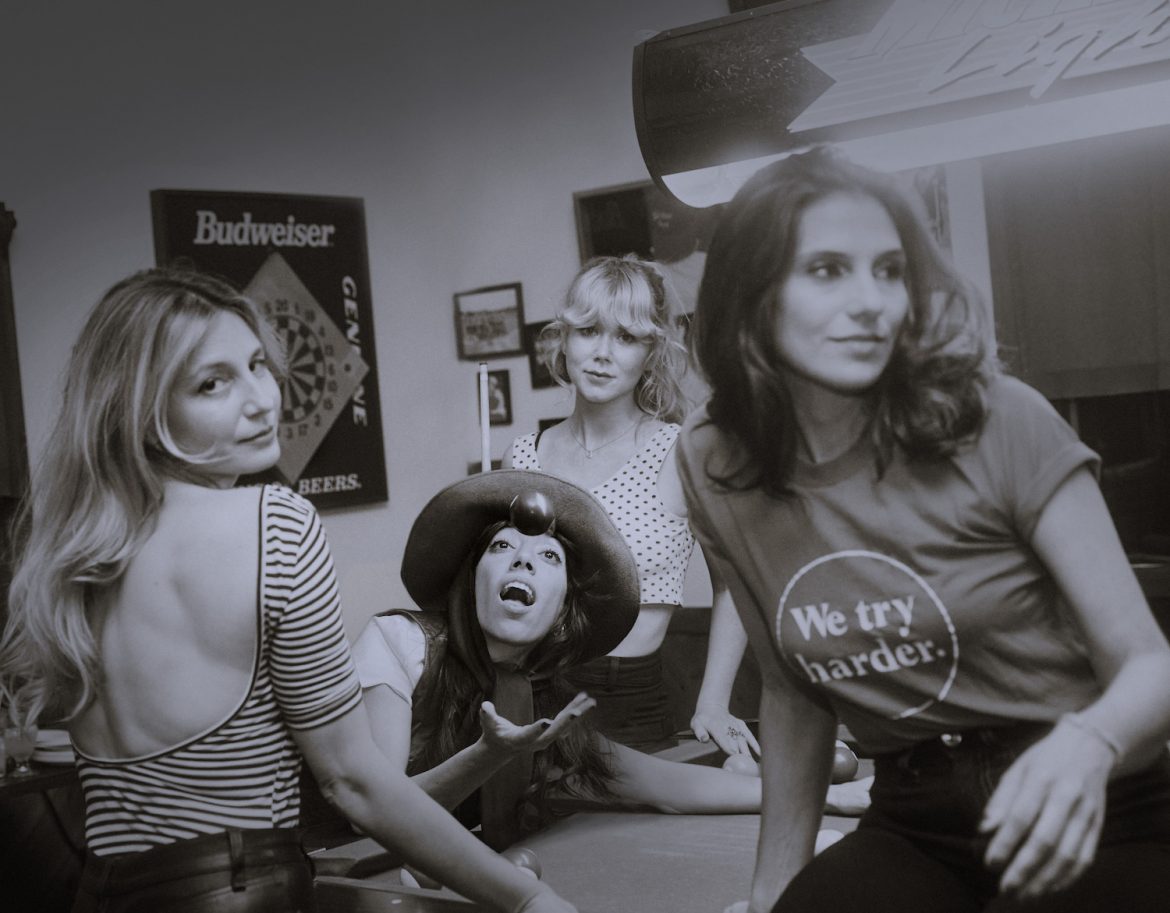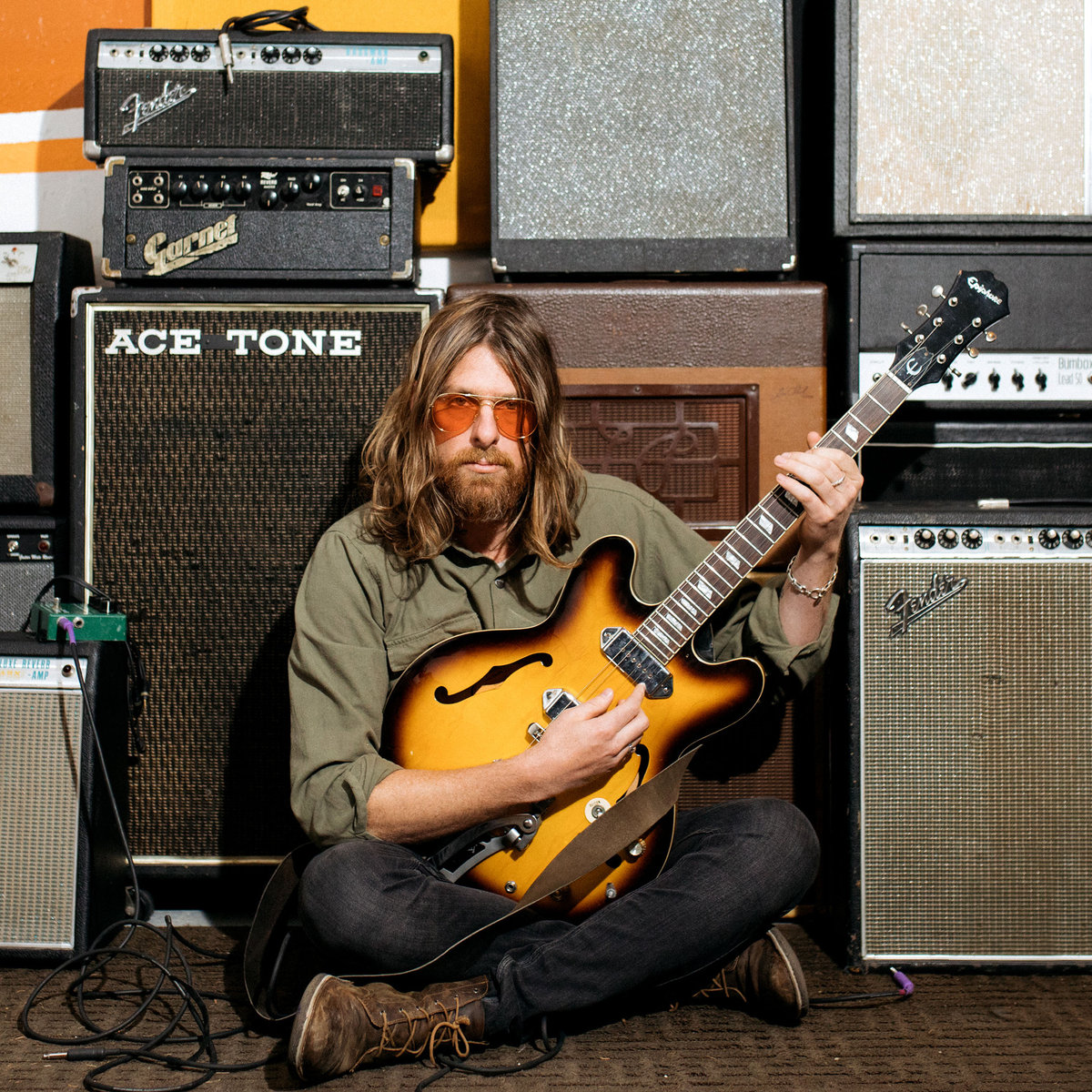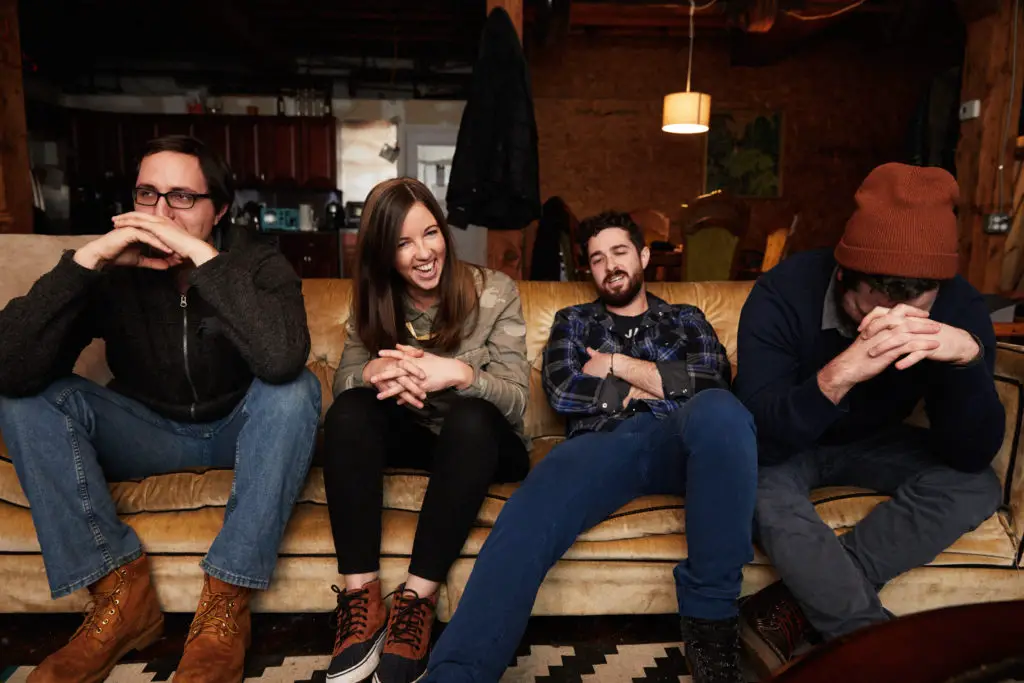Habibi only had one album to their name for five years – mainly because they only needed one album to prove their point. During Treefort 9, they discussed what inspires their impishly catchy musicality and where it goes from here.
Stream: ‘Somewhere They Can’t Find Us’ – Habibi
The Brill Building philosophy asked, “How can we write the perfect song? What’s going to explode?” – [and] I feel like we definitely are inspired by that kind of mentality too: We don’t want to just to write filler songs; every song, we want to get in your head.
About six months ago, I was offered an opportunity to cover my first festival for Atwood Magazine. I’d never done that before, to be honest, and I didn’t know how to prepare besides listening to as much music on the bill as humanly possible. There were still too many.
But there was one band I did know; one I found while delving into the surf rock and sounds of La Luz, the Allah-Lahs and the Growlers, hidden in the corners of the related artists sections and oozing every bit of style found in Dick Dale or the Ronettes and a fast respect for post-punk icons ESG; one that recently released Anywhere But Here just prior to the long quarantine of 2020 after an even longer interregnum from their debut; and one that hints at stirrings for the next album that might just be around the corner.
That band was Habibi.

Led by the one-two punch of Rahill Jamalifard and Lenaya “Lenny” Lynch, this band is the definition of a cult classic. They only had one album to their name for five years – mainly because they only needed one album to prove their point. Eponymously titled Habibi and released in 2014, its name comes from the affectionate Arabic phrase meaning “my love.” But don’t take this band for some sort of sunny Middle Eastern rock outfit; Jamalifard prefers to downplay the Persian influence in their music.
It’s easy to understand why: Habibi contains everything someone would love about surf rock, the Brill Building sound, and Motown. For 29 minutes, the women behind Habibi triangulated between Los Angeles, New York, and Detroit to find the seismic center of what makes all three tick and what makes them mesh in a garage setting.
And then they disappeared into the ether.

Not until a week after its release did I learn Habibi had returned with Anywhere But Here, a second helping of rock and roll distinct to these Detroit natives. No sophomore slump here: They just leaned into those Detroit-area roots more heavily. Adapted New York production practices more cleanly. And most important of all, this band learned to ride that wave of nostalgic music and not let go.
They certainly played that way both times at Boise, Idaho’s ninth Treefort Music Fest – turning the Neurolux into a sweatbox of beggars pleading for just one more song past Saturday’s curfew, and setting the table for one last magical Sunday night at the El Korah Shrine. Both crowds were on a string, bobbling back and forth, side to side, toe to heel and back again. But it was at the El Korah, where they touted crowd favourites like “I Got The Moves,” “Angel Eyes” and the transporting “Come My Habibi,” and unleashed the newer, funkier, tantalizing “Somewhere They Can’t Find Us.”
Now, two weeks past this magnetic new single’s sortie, the band have released their next EP, which promises to bounce around in sounds picked up from late Seventies New York. After about a month of compiling audio and sorting photos, I’m happy to share our ramble-tamble conversation between sets.
These sounds that came out of America is what – truly – it is to be American. Dick Dale was of Lebanese ancestry, and yet he is the king of something that seems very, very all-American: Surf rock.
— —
:: stream/purchase Somewhere here ::

A CONVERSATION WITH HABIBI

Atwood Magazine: Hey Habibi! What have you guys been listening to lately?
Lenny Lynch: I feel like everything I’ve listened to is old country. I feel very boring since the before the pandemic because it’s pretty much (laughs) all I’ve listened to. But I mean, last year, we were listening to a lot of dance music too. And I think we come together on… what we want to do and, and pursue.
Rahill Jamalifard: I’ve been listening to a lot of Lee Morgan and Larry Heard, just want to say that. I like these two records I’ve been listened to in rotation for weeks.
You talked about that last night at the Neurolux, where you just wanted to dance, and that was what informed Anywhere But Here. What music informed that new record?
Lenny Lynch: Yeah, we play [ESG,] that meant a lot to us… If you’ve ever heard their stuff, it’s all about the bass. Just like with nightclubs, it’s all about the bass.
Rahill Jamalifard: We played a show with them a couple years ago, and I think we both like love to dance, but our dance music isn’t like classic disco per se. It’s more like this crossover of like 70s punk influence where these are Puerto Ricans who grew up in New York were making disco but clearly influenced by the percussion and bass lines that come from somewhere outside of just like classics like Chic… and I think we both really like love that stuff… but we never truly delved into like that style of music.
I think the most amazing thing about this is that for six years, there was nothing .We just had one Habibi record to drive everybody wild.
Rahill Jamalifard: We didn’t even know that people were into it.
Lenny Lynch: We didn’t have a clue!

What was the development like for Anywhere But Here? I imagine it was somewhere in development hell for a long time, but when did the gears start to turn?
Lenny Lynch: When you start a band, and you’re not making any money… New York is already a tough place for bands to thrive. We decided to work on other projects that were more like recording projects, less touring projects, but then we saw the response, and we had some songs that we never fully fleshed out; that we had already been working on. And we were like, “What is going to be our goal for this next album? What do we want to say, especially?” We were going through things, whether it be falling in love or falling out of love… but it also felt like the world was kind of like—
Rahill Jamalifard: Trump becoming President, where it felt like “what—is tomorrow gonna even be a possibility?”
Lenny Lynch: Right. It felt very unwelcoming to women and to musicians, and to anybody, you know, who’s not like a rich person.
Rahill Jamalifard: Escapism, basically, was, the theme. I think Lenny and I are kindred musical spirits, where it’s like, “Oh, I thought you showed me but you said, I showed you that.” It’s like, we don’t know who shows what… And it’s so wild, because it’s even till up till now, even since yesterday, it’s like, she still puts me on to stuff, I put her onto stuff. And it’s [songs] that hit us both the same way that we maybe listened to at different points in our lives. But once we both hear them, it hits in the same place, or whatever. So I feel like when we realized that that’s such a special bond, and so of course we want to continue it.
There's one particular song off Anywhere But Here, “Born Too Late.” And I imagine it's supposed to opine on our late arrival to the party. But I like it. And of course I extrapolate that to a generational sense. Am I reading too much into that?
Lenny Lynch: No, I love that… It’s funny because these girls I grew up with in Detroit–their granny was in a band called The Poni-Tails from Ohio and they did an old song called [“Born Too Late”] like “born/ too late/ for you to notice me.” It’s very very cute and like 50s doo-wopish. And that stuck with me though, growing up where I was like, Yeah, I felt like I was not born for this world. And there’s a caveat to that, where… as women, we’re very, very happy that we have the right to, you know, do a lot of things like—
Rahill Jamalifard: Like open a bank account.
Lenny Lynch: Yeah, like open a bank account without your husband or your dad being there, which you could only do that after 1972. However… you fantasize about all these times in history… especially being from Detroit and living in New York. There’s all of this music history where you [ask] “why weren’t we there?” We are late to the party.
Surf rock and R&B have undergone a sort of renaissance in the last decade. What do you think makes this crossover so appealing?
Rahill Jamalifard: I think that when you hear that music, it evokes nostalgia, the most common denominator between everybody who hears it. Because if I meet somebody who like put you put on Motown and they say “turn this off,” like, I don’t know if I can trust them.
Lenny Lynch: (chuckles)
Rahill Jamalifard: Honestly because it is just so nostalgic and it’s so brings you to like this really sweet place, so endearing and warm… When you listen to that music it brings you back to like a happy feeling or something you know because that’s what it’s supposed to evoke, you know?
Lenny Lynch: I’m not trying to be, like, patriotic but I really feel like that’s what America is too. These sounds that came out of America is what—truly—it is to be American. Dick Dale was of Lebanese ancestry and yet he is the king of something that seems very very all American—surf rock, you know. [When] it really came from these beats and these rhythms, rhythmic patterns that inspired him were from another place and another land and that really is what makes makes me—if I’m ever proud—of like being American; it’s because of all of the incredible immigrants and Black music… that came together to be American music and culture.

100%. Another thing that is overlooked is the Brill Building sound that you guys have… are you guys in some way familiar with the Shangri-Las?
Rahill Jamalifard: We were just talking about them today.
What particular song between the Shangri La is your favorite?
Lenny Lynch: Oh man you know I would have to think about that but… I keep on seeing these TikToks—I’m like too old for this (laughs) – but I keep on seeing TikToks that have “Remember Walking in the Sand.” And I’m like how do these kids that are making TikToks [know this] this song. It’s really old and it’s like… a B-Side Shangri-Las song. It’s pretty amazing when something gets like resurrected like that.
I am album-oriented, where it's not about the individual songs. It's how that collection works together.
Lenny Lynch: Yeah, but that’s hard with these old bands, especially that era of like late-50s, early-60s… It wasn’t about the album so much as… the production and the writing of each song.
Rahill Jamalifard: Think of the Ronettes and it’s, like, hit after hit but the album’s kind of secondary. That’s why when you walk into a record store, there’s like 50 compilations of greatest Shangri-Las hits, greatest Ronettes hits.
Lenny Lynch: That’s how people bought music at the time. You got the 45 and played it over and over again. The Brill Building [philosophy asked] how can we write the perfect song? What’s going to explode? Which I feel like we definitely are inspired by that kind of mentality too, we don’t want to just to write filler songs every song we want… to get in your head.
Rahill Jamalifard: We want to sound like Wrecking Crew came through and just was like, “Let me just give you the most timeless bassline, let me give you the most –“
Lenny Lynch: But punk!
Rahill Jamalifard: There’s a different value of like the craftsmanship that we both appreciate because we have such a huge love of that of that era of music that we like recognize that these are compositions, that are meant to live.

Likewise, I think this is tied to your comment about nostalgia there's been a rise in the use of cinematic terms to you to like to describe musical ideas. Do you guys consider your music to be cinematic? Or is that kind of a happy coincidence that happens?
Rahill Jamalifard: I think so. It’s not just like sound when I’m thinking about music when I’m writing music, when we’re playing music; it’s visuals, too. [Artists] who I love create worlds, like Joe Meek and… I equate a place to music and I think that’s just a natural [way of thinking.]
Lenny Lynch: (to Rahill) You wanted “Angel Eyes” to be about the Angel Eyes cowboy from The Good, The Bad, The Ugly, and—talk about cinematic music—Ennio Morricone’s whole soundtrack is so visual and I would love [it] if we’re ever compared to something like as incredible… where it is cinematic music and you do envision yourself out writing a steed through the desert.
Speaking of one of your most cinematic songs, “Come My Habibi” is like a Dale dervish embedded between what I assume to be Tonbak drums.
Both: Yeah.
How did that song come about? Because this sounds like it comes straight from the satrap.
Rahill Jamalifard: From the what?
From a Persian court.
Rahill Jamalifard: Oh, yeah, yeah, um, that’s funny. [That song] was like the first song that we ever wrote… and we had more of a pretty song situation. The [debut] is very pretty, very gentle and [“Come My Habibi”] was this crazy song. We were both like wait, this is sick, this is great. It’s almost Sabbath-y or something. We weren’t honed in enough to like know where that went. It didn’t make sense. So it [was] shelved forever.
Lenny Lynch: Yeah, the first album was very positive, very bubblegum and very, like, teenage, even though we were like, not teenagers. (laughs)
Rahill Jamalifard: [Those] were my teenage years when I was writing songs.
Lenny Lynch: We didn’t know if we were going to put [“Habibi”] even on Anywhere But Here and it wasn’t till the last few days of recording, where Rahill was like, “What about that one? We got to do that,” and… I couldn’t picture where it was gonna go.
Rahill Jamalifard: But then we were in contact with all these session musicians who are Iranian musicians. So we had a guy who played tonbak with us and we had our friend who does like a ululation, which is like a voice weird thing that you do. It’s customary in Arab and Iranian… cultures. It’s like a celebratory sound. But we knew exactly how to really make that work within the body of work. I always say Lenny’s like an undercover Iranian… And [“Come My Habibi”] just really does sound so — I don’t want to say Sufi — but it takes you into a trance which is very Sufi style.
Should we expect more of this form from Habibi?
Rahill Jamalifard: We don’t really want to be pigeonholed into a single sound because, like as always, we want to evolve but… there’s always going to be like some sort of Middle Eastern element. But I hate to [say] “oh yeah, we are a Middle Eastern inspired band.”
Lenny Lynch: It’s always like does this fit with this and with the next album… I think it’s gonna be a new sound. What I appreciate about “Habibi” is we felt like we [could] put this on this album now. We didn’t know how it would be received and then it was received incredibly and we started playing it live and people [started] headbanging. Like, what?!
Rahill Jamalifard: We didn’t get to play it last night.
Lenny Lynch: We were supposed to!
Rahill Jamalifard: We’re gonna play it tonight but the people go crazy.
“Come My Habibi” instantly becomes the one where everybody's fixating on it and you kind of just threw it together. Do you feel like that's more common than not when you're making music?
Rahill Jamalifard: There’s something magical about something thrown together because it’s not like overworked and the analogy is: if you put too many ornaments on your tree it’s just gonna lean over; if you have like a couple it just stands there perfectly…
Lenny Lynch: With the last album, we had skeletons of certain songs… but we want to discover what else we can do in the studio. Then the hard part is after it comes out is transferring it to live stage… The other side of it is less than a sketch of something or sometimes, under pressure, you’re like we need another song!

How do you feel that COVID-19 pandemic has changed the focus of the music industry? Do you think it changed from the live aspect to the studio aspect or do you think the live aspect has just been dormant because of safety regulations?
Rahill Jamalifard: People really do miss playing live. I think that it’s like an innate thing to want to be around—in all humans—to be close to performance. That’s never gonna leave… I was talking to Sonny and the Sunsets and they were like “I’m just so high after this show.” That feeling—for audience and performer—is never going to change. It’s been such a weird transitional [period] like now we’re back to normal but it’s not normal. [I]t’s still in effect, this transition, but I don’t think that the love of either thing has like changed or greatened or lessened. I feel like it’s just when in human time have we not participated in watching or performing music?
The last time was probably the Spanish flu.
Lenny Lynch: Yeah, live music isn’t going away, I mean, I would love to say that we have a whole album written… but I’m with all those people that felt incredibly depleted during this time as well. [T]hankfully, we got busy with a couple songs and were like “Oh, great, we’re on our way; we have more work to do.”
One thing that hindered us was we weren’t spending as much time together. We still haven’t been able to go to our old practice space—they’ve closed up. [I]t did put a pause even on the creative side of it where we can beat ourselves up we should have a whole album written right now. You know, we should have a double album. (laughs) For all the time we had!
But… [did] you ever hear that expression “if you want something done, give it to the busiest person?” Sometimes being busy helps that creative energy flow, you know. So I’m excited about getting busy again and being with the girls and, you know, and making some songs.
— —
:: stream/purchase Somewhere here ::
— — — —

Connect to Habibi on
Facebook, Twitter, Instagram
Discover new music on Atwood Magazine
? © Bailey Robb
:: Stream Habibi ::








